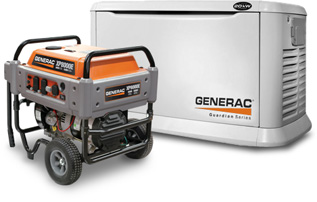
Can One Generator Be Both Portable and Standby?
A portable generator is not suitable to use as a backup generator. A standby generator is a better choice because:
- All portable generators make electricity from fuel: gasoline or diesel. Generators in the 8000 watt range produce enough electricity to run a refrigerator, some lights or a stove. They consume roughly a gallon an hour of fuel, even at 50% load. Typically, they have a 7-8 gallon tank.
- You'll need to have one gallon of fresh gasoline on hand for every hour you want to run a large portable generator even at 50% capacity.
- On average, the most worrisome power outages can last 3-7 days.
- Every 3-4 days of a power outage you should have approximately 100 gallons of fresh gas on hand.
Powering your Generator
It is important to remember that once there is an outage the pumps at the gas station will not work. This means you will have to have the 100 gallons of gas on hand and you will have to continually replacing it because gasoline cannot be stored for prolonged periods before going stale. The maximum amount of time gasoline can be stored is 1 year if stabilizers are added and the risk of ruining your portable generator with stale gasoline is a concern, also keeping such a large amount of fuel on hand is dangerous and in some municipalities illegal.
| Portable | Standby | |
|---|---|---|
| Automatic Backup Power |  |
|
| Portability |  |
|
| Whole House Back-up |  |
|
| Fuel Capacity | 1-16 Gallons | Unlimited |
| Noise | Can exceed 70 decibels | 60-70 decibels |
| Risk of Theft | High | Low |
Standby generators, however, offer a nearly unlimited fuel supply, because they connect to either your natural gas line or a propane tank. No thought or planning needs to be made once your power goes out; the standby generator automatically senses the power outage and within seconds powers your home.
Safety
Portable generators should never be operated indoors nor within enclosed areas. To operate a portable generator safely, the unit must be placed away from any structures and the use of an extension cord is essential to bring power into your home. The tank must be refueled after several hours of use, which can involve refueling late at night.
With a Generac standby generator, you never have to worry about toxic exhaust because the units are installed within a safe distance from your home. Again, there is no need to worry about refueling because a standby is permanently hooked into your home's gas supply.
Risk of Theft
Theft is another concern when operating a portable generator during an emergency power outage. During a power outage, authorities are likely overwhelmed which leaves a noisy portable generator vulnerable to theft. Portable units are easily stolen because they can be wheeled away quickly.
Standby generators are permanently installed near the side of your home and are much less noisy than portable units that would otherwise attract attention. Factor in the weight of the unit, its connection to your home's gas and electrical lines, and the foundation; it's obvious a standby is much less a target for theft.
This is why portable generators are great for sporadic on-demand use, but they should never be used as a primary standby power source. If you are considering an emergency standby generator, we recommend a Generac Guardian or Quietsource.














